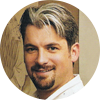I recently had a patient present to my office for acupuncture. She had seen a documentary on TV about how acupuncture could help with weight loss. During the consultation, I told her, "Yes, acupuncture can help with weight loss, but we also need to talk about diet and exercise." She became very angry.
We have all had the experience of patients who come into our office asking for a "quick fix." Some have even gone so far as to question the need for an exam. They could, after all, just as easily go down the street and have a therapist work them over without all the extras. Their only concern is to feel good. There is no thought as to the cause of the problem, the body's natural healing mechanisms or the consequences of inappropriate treatment. There is a demand for immediate gratification. They want to hear the old adage "take two aspirin and call me in the morning." They want the magic bullet - a certain pill or supplement that melts the problems away.
However, we live and practice in the real world. Many patients have forgotten that the very process of healing is miraculous alone. There is often a gap between what some patients expect and what is realistically possible. And while we could point fingers in all directions as to who is at fault, we cannot forget that it is our responsibility to educate patients about the real healing beyond just feeling better.
Our society has come to accept the idea that feeling good is the same as being healthy. The notion of spontaneous healing is now overshadowing how many approach their personal health habits. There appears to be no consequences to unhealthy living. After all, so the thinking goes, whatever happens can be made better by a prescription. Now don't get me wrong; medicinals have been a part of the traditional healing system for centuries. My point is that too many patients have unrealistic expectations of the benefits and no concept of the side effects. It is also arguable that this concept of spontaneous healing is reinforced by modern advertising. Remember the suffering people on opposite sides of a deep chasm being joyously reunited by a "little purple pill" closing the void? Or people languishing in a dull world of black and white who then take sinus medication and are miraculously better, instantly in a smiling world of bright sunshine and color.
Certainly, we know this is not reality. However, a lot of our patients don't. At least unconsciously, they expect a miraculous result. This type of thinking has been spoon-fed to our culture for decades; patients expect immediate relief, no strings attached. Nowhere in the course of my education was I taught that spontaneous healing was the norm. There is a natural process the tissues go through, often called the phases of healing. Inflammation must subside before the soft tissues can begin to heal. (Pain often decreases with inflammation, so you can feel better before the healing is done.) Feeling better is great, but should not be the sole focus of a responsible health care provider.
To add some perspective, I can share the story of a good friend from China. She is a doctor of traditional Chinese medicine, and had practiced in China for many years before coming to this country. The interesting difference is that she was paid by the community to keep everyone healthy. If someone became ill, they did not pay for her care until they were restored to health. The focus of her practice was totally on maintaining health, not on fixing illness after it manifested.
So what have I learned? Probably the most significant lesson is that there are various perspectives of healing. Most people still equate feeling better with total healing - and will become frustrated with their care if it does not produce the expected immediate results. If your patients don't perceive a value to what you do, they will not return for care. We need to understand what patients are expecting from our care, explain what we can do to help, and how long that may realistically take. There must be a plan for treatment and the patient has to know what that is, and understand it.
There is no magic bullet - that is a myth. Healing is a natural process and you can't cheat nature with chemical or therapeutic means. We should not forget that the innate process of the body healing from injury is miraculous in and of itself. It is an awesome responsibility and privilege we have to help people become healthy and stay that way. We should never lose sight of that concept.
Click here for more information about Douglas R. Briggs, DC, Dipl. Ac. (IAMA), DAAPM, EMT.




